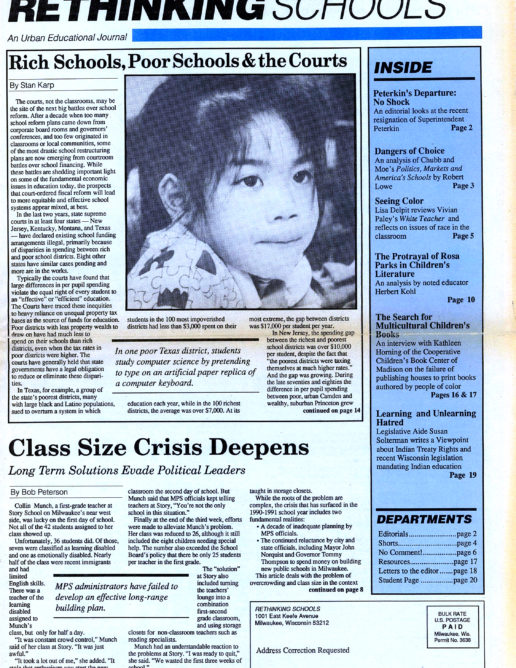Peterkin’s Departure: No Shock
Some in the Milwaukee community have expressed astonishment and outrage at Superintendent Robert Peterkin’s announcement that he plans to accept a position at Harvard University when his contract expires at the end of June. Realistically, however, while Peterkin’s decision disappoints us, it should come as no shock.
Most large city superintendents in fact do not stay long in one location. As in industry and many professions, the most successful, powerful individuals tend to be highly mobile. Little in our broader American culture of individual achievement actually encourages commitment to a particular community over personal career advancement.
More than simple selfishness is involved as well. Frequently those who come from outside the community to assume a high post bring with them a national orientation rather than a local one. Indeed, the Board of School Directors hired Peterkin because he was aware of and involved in educational reform efforts across the country. Peterkin’s national reputation and his status as an outsider allowed him to act as a strong leader; he brought together (at least temporarily) some unlikely allies in Milwaukee and pursued change more boldly than a locally entrenched leader could have. Hence the very qualities that made Peterkin attractive to the board and have made him effective in his two and a half years in Milwaukee, have also made his longevity as superintendent less likely.
Peterkin’s leadership has given the Milwaukee Public Schools a vision of equity and excellence for all children. He has encouraged individual initiatives for change; schools or groups of educators who have approached his administration with well designed plans for innovation and reform have generally found approval and support. As we saw at the recent school board hearing soliciting public input on the desired qualities of a new superintendent, the Peterkin administration has led the community to expect educational change and has expanded the access of some key community groups to school decision-making.
Still, a great deal remains undone, and the complex task of translating visions into real change has barely started. If it is naive for us to be shocked by Peterkin’s departure, the Milwaukee community has every right to be disappointed and angry. While it is uncommon for superintendents to stay long in one position, those who do stay are most likely to have an impact on the lives of the children. Peterkin has awakened expectations of change and has seemingly left us hanging.
But Peterkin’s departure must remind us how change truly happens. He did not sculpt an educational vision alone, and he could never have implemented it alone. We will never find a great hero to deliver us from the complicated challenges we face in education. Lasting change will come from parents, teachers, students, community leaders, secretaries, librarians, school board members, and others. If there will be any reform, we will make it happen.
Careful educational change demands a commitment to long range planning. It also demands a sustained commitment to the larger community. If we want schools to work, we must fight to make Milwaukee a sane, rational, safe place for everyone.
Leadership is important. Peterkin’s departure must not be used as an opportunity to abandon those positive reforms that have begun, slipping back to a status quo that was perhaps more comfortable for many of us. The school board should name a new superintendent — not an acting superintendent — who can press educational reform forward without missing a beat. Deborah McGriff is the best candidate for this job, since she has played a key role in shaping and implementing the current vision.
The future of our schools also depends on whom we choose to represent us on the school board, in teacher’s unions, in parent associations, and in local and state government.
Ultimately, every resident of Milwaukee bears a powerful responsibility for the future of this city’s children. Peterkin’s resignation and the anger it inspires should remind us that leaders do not make change, communities do.

